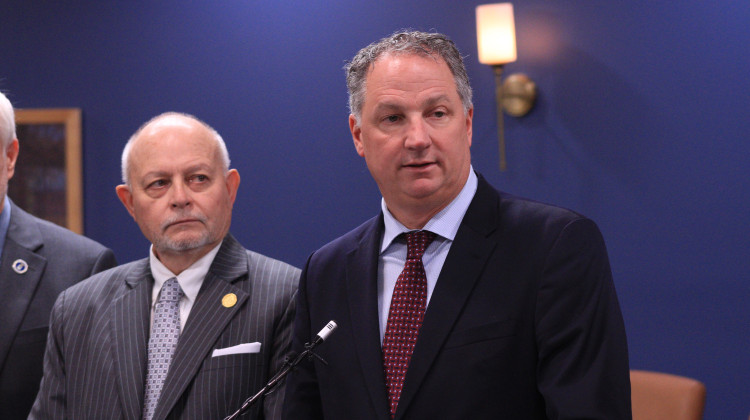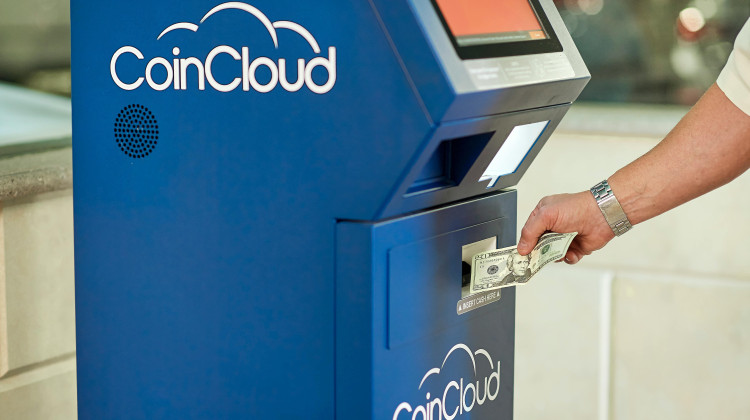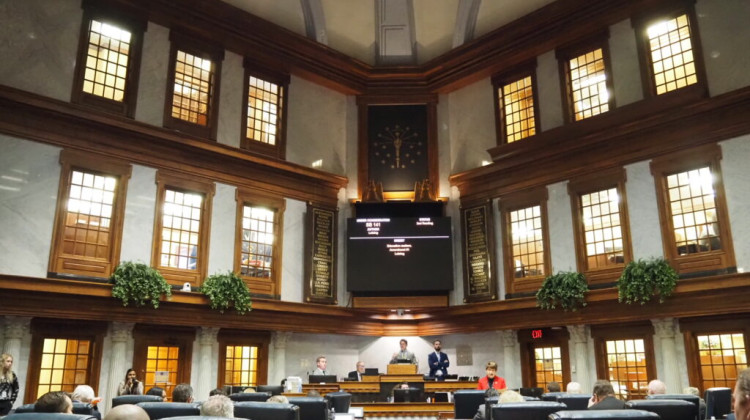
The bill was authored by Rep. Sharon Negele (R-Attica), who said the bill will provide the refund while also supporting mothers and children.
Ben Thorp/WBAAThe House Ways and Means Committee passed its version of inflation relief Tuesday that would send a $225 check to eligible Hoosiers.
Indiana residents who were not required to file tax returns with the state in 2021 can sign an affidavit in order to claim their $225 return.
That was a sticking point for members of the Indiana Department of Revenue. They said that could include anywhere from 300,000 to 800,000 additional Hoosiers and require a massive effort to verify each affidavit.
Stephen Madden is the director of tax policy at the Indiana Department of Revenue. He said verifying affidavits will be a massive undertaking.
“We are also considering the cost and timing of hiring an outside company to verify the identity of applicants since many of these people have never previously filed a return with the department,” he said.
That is one potential solution for older Hoosiers, Hoosiers with disabilities and Hoosiers who didn’t make enough to file taxes.
Ambre Marr is with the American Association of Retired Persons in Indiana. She said the group supports the affidavit system.
“It is a very short time frame for individuals to have to learn about the affidavit and then file since the deadline is Oct. 1,” she said.
Join the conversation and sign up for the Indiana Two-Way. Text "Indiana" to 73224. Your comments and questions in response to our weekly text help us find the answers you need on statewide issues.
The bill, HB 1001, includes a number of tax exemptions for dependent or adopted children. It also expands Medicaid coverage to include labor and delivery services for people likely to qualify. The proposals come as the Senate is moving forward with new abortion restrictions.
Specifically, the bill would allow providers to file claims for mothers who are “presumptively eligible” for Medicaid coverage for labor and delivery but are not currently enrolled. Sponsors say this stipulation would help eliminate financial barriers for low-income parents.
Estimates for childbirth in the state have been anywhere from an average of $9,000 for vaginal birth to upwards of $29,000 for a C-section.
The bill was authored by Rep. Sharon Negele (R-Attica), who said the bill will provide the refund while also supporting mothers and children.
“We as Hoosiers are looking for a fiscal impact to help Hoosier families, moms, and babies for close to between $79 [million] and $89 million in fiscal impact,” she said.
Monique Kulkarni is a licensed psychologist with Valley Oaks Health, a community mental health center. She said she supports the funding the bill puts towards various maternal health services – but she said it’s not enough.
“A one-time allocation of funds, when Indiana ranks third in maternal mortality and 43rd in prevalence of mental illness and access to care, won’t even be a drop in the bucket for the many agencies referenced in this bill,” she said.
Democrats repeatedly pushed for the legislation to do more, introducing a series of amendments that were largely struck down.
Rep. Ed DeLaney (D-Indianapolis) introduced an amendment that would have paid for all childbirth expenses. He said as the Senate moves forward with abortion restrictions, the state should cover all childbirth costs.
“If this state thinks that having babies is the issue then we oughta pay for it,” he said. “Especially in an environment where apparently we’re going to order people to have babies.”
The amendment failed.
The bill largely lines up with proposals from Gov. Eric Holcomb for inflation relief but differs significantly from what proposals in the Senate. That bill, SB 3, would suspend sales tax on various utilities and cap the gas tax until June 2023.
Economists and lawmakers in the Senate have argued that sending a check to Hoosiers could contribute to inflation.
The bill passed unanimously out of committee with some minor amendments and now moves to the full House.
Indiana Public Broadcasting Violet Comber-Wilen contributed to this story.
Stay in touch: sign up for the Indiana Two-Way by texting "Indiana" to 73224.
 DONATE
DONATE






 Support WFYI. We can't do it without you.
Support WFYI. We can't do it without you.